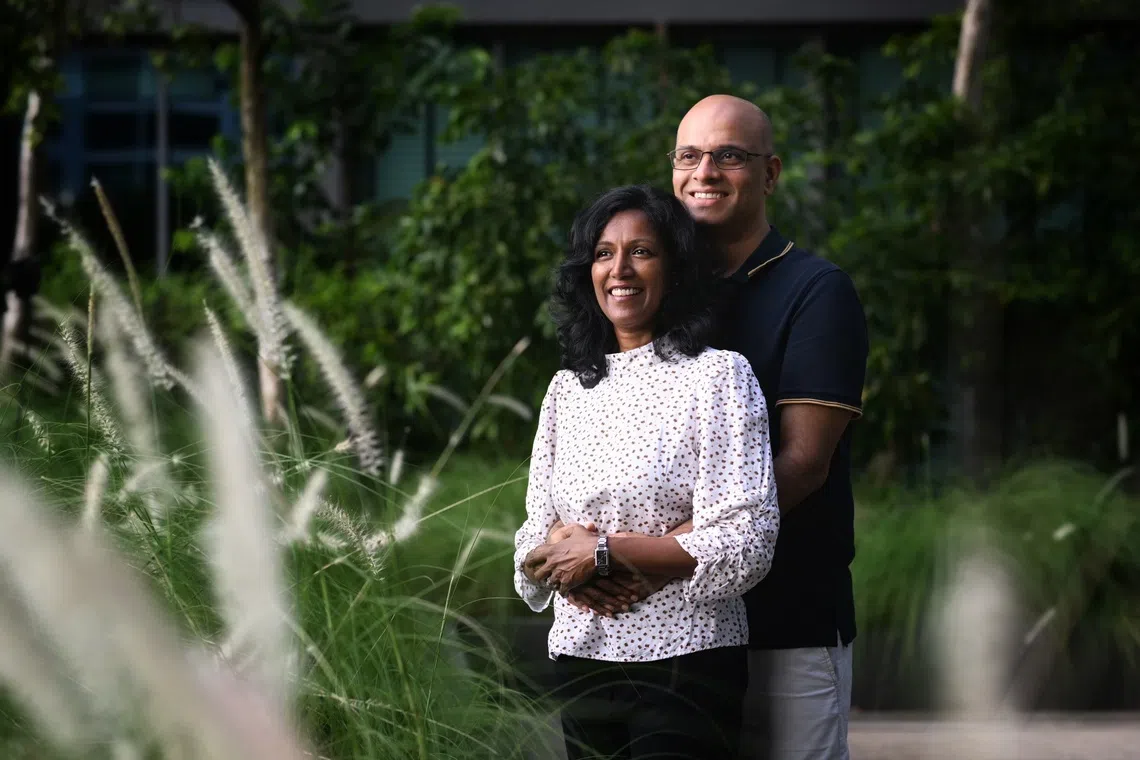Fostering teens: Dealing with academic stress and a teen romance
Sign up now: Get ST's newsletters delivered to your inbox

Mr Bhaskar Peri and Mrs Hema Peri are mindful of how they communicate with their foster teen.
ST PHOTO: CHONG JUN LIANG
Follow topic:
- The Peris, Singapore permanent residents from India, have been fostering children for six years, and find teenagers a unique challenge.
- Their current foster child, Rosie, initially struggled with foster care, wanting to stay with family, but now thrives academically.
- The Peris learnt to adapt their parenting, providing space and support, and communicating experiences to Rosie, not lectures.
AI generated
SINGAPORE – Mr Bhaskar Peri and Mrs Hema Peri find fostering a teenager an entirely different challenge from the other five children they have fostered over the last six years.
Mr Peri, an account manager in a technology firm, says: “It’s like starting a new adventure compared with caring for smaller kids. If you have been raising a child from a young age, you can gauge his or her reactions and moods.
“It may seem easier to care for teens because they know how to express themselves, unlike young kids, where you have to find out what they need. On the other hand, if teens don’t want to talk, they won’t.”
The couple, who declined to reveal their ages, are Singapore permanent residents from India who have been married for 15 years.
Their current foster child, aged 14, has been living with them for 2½ years, the longest any of the children have been with them.
Their other charges – some of whom stayed with them as briefly as a weekend or six months – ranged in age from one to 12 years old.
They have never wanted to bear children of their own.
Mrs Peri, a client support manager in a market research firm, says: “Even while we were courting, we wanted to adopt. We didn’t want to bring another child into the world, but we see a lot of children who need a home, care and attention.”
Seven years ago, after they attended a fostering agency talk, they decided to give it a shot.
When their current foster child, Rosie (not her real name), came to them in 2023, she was 12. It was a bumpy start.
Mrs Peri recalls: “There was no reciprocation or reaction from her. We thought we were doing something wrong and I doubted myself after a while. I asked if it was something about me or the food we ate. But she only shook her head slightly.”
Later, the couple realised, through the help of Rosie’s social worker, that the adolescent was having a hard time accepting foster care. She had wanted to stay with a member of her extended family instead.
“She didn’t have the words to express herself. We realised it was best to give her space,” says Mrs Peri.
The adolescent also had struggles typical of her Primary 6 peer group. Both she and her foster parents underwent Primary School Leaving Examination (PSLE) stress together.
She did not like it when they told her to study, prompting them to back off.
Mr Peri recalls that Rosie worked hard just before the PSLE. “We knew this pattern would continue as we realised this kid thrives under stress.”
The couple hoped she would at least pass the examination, but to their delight, Rosie screamed with joy when she got her results slip. Her grades had snared her a place in a sought-after school.
In secondary school, they noticed a shift. A few months before Rosie’s examinations, she asked them for practice papers, and put in extra hours hitting the books.
Mrs Peri, who has been reading books on parenting teens, realised that fostering an adolescent meant she had to be mindful of the words she used.
She advises: “Don’t give a lecture. Say things once. Don’t say, ‘The bed is not made.’ Try saying ‘I think the bed needs to be done’ instead.
“You don’t need to have deep conversations daily. Sometimes when she’s upset, I just need to be physically present. It calms her down.”
When Rosie was in Secondary 1 in 2024, Mrs Peri found out she had a boyfriend.
“I didn’t ask her about it directly. She doesn’t like it when we ask questions and I didn’t want to put her on the spot. I shared my experiences instead,” says Mrs Peri.
“When I was a teenager in Bangalore, there was a girl who tarnished her reputation when she had at least three boyfriends at the same time. It’s nice to be in love, but it’s important to maintain your boundaries and dignity, I said. Rosie was all ears.
“My mother used to tell me that when your child grows to the height of your shoulder, you should treat her like a friend.”


